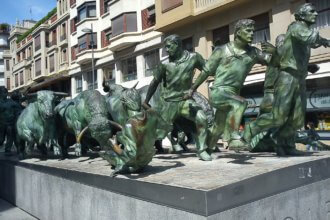
Editor’s note: Each month, we will publish a short work of fiction that resonates with the issue’s theme.
Denim Seashells
By Matt Charnock
On the first Friday of every month, Isabella found herself in a state of suspended anticipation; it was, after all, the sole day of the month she had the means to travel beyond her urban sprawl.
The sixteen-year-old children of Mendocino could only travel so far on foot in the mid-80s. Public transit had not yet made its way up from San Francisco; no rail system could be seen snaking through the redwoods, birthing and breathing dense smoke and bitter ash. The dull roars of Boeing 747s rarely echoed along the salt-licked cliff sides. Like a labrador chained to a backyard fence post, the graduating class of ‘89 were left insulated, disassociated, living in a collective bubble. Stagnant to the outer bounds of society.
“When does mom get home?” Isabella yelled, her feet tapping underneath the mahogany kitchen table. “She said four, right?”
“Yes! Stop asking me that,” screeched a smaller, shrill voice from across their one-story house.
With the haste of a woman who could both plant and plow a field of wheat, Isabella’s ten-year-old sister, curly brown hair draped over freckled cheekbones, slammed the door that lead to her room.
“She’ll let you have the car before sunset, like usual…so stop bothering me,” the muffled voice behind the chipped white door added.
Isabella liked watching time collapse over Rodeo Beach. The way the sun hugged the swells running toward the outgoing tide. How the frantic waves splayed the smaller black, coarser stone pieces into abstract shapes along the brown shoreline, like black ink flung onto a frameless beige canvas. Tidal pools become sanctuary cities for sea life in the half-light of early evening; life that would had otherwise been left to face a dystopian death, was saved, however temporary.
When the waterline receded just far and long enough for her to eye the swaths of exposed seabed, Isabella would hastily go about pocketing sea shells into whatever means of textile pouch she could find.
Akin to an engorged hamster, her pockets swelled.
“Well, fine then! I guess you won’t be getting a shake from In-and-Out,” Isabella said even louder this time, her feet continuing to busy under the kitchen table.
An ‘87 Camry soon pulled into the driveway, the white of the headlights bringing to life the free-flying dust of the living room. Isabella ran toward the garage door, already cloaked in a weighted nylon coat and what she would say was beach-ready attire.
“Finally,” she said. “I’m going to miss the tide go out if I don’t leave soon!”
Her mother grinning, “Are the dishes put up?”
“Yes,” Isabella answered.
“Did you leave your finished weekend’s homework on the kitchen table?”
“Yes,” she smirked. “Can I go now?”
Her mother rifled through her coat pocket, sifting through a metallic gnashing of loose copper change and stray black buttons, until she coaxed a single car key into her hand and promptly plopped the key into Isabella’s open-faced right palm.
“Be back before ten,” her mother said before walking into the walkway.
“And don’t forget Shelby’s shake!”
The roadways leading toward Rodeo Beach were luminous; it was considered anathema not to admire the spans of thick evergreens and plump oaks shouldering the white lines. In much the same way Isabella’s mother would embrace her before dance recitals, deciduous limbs reached and stretched and enveloped the skies above these roads; a safe, warm, green presence that softened the drab concrete below. That familiar tenderness continued for miles, stopping just shy of the coast, the moment the Pacific’s briney atmosphere wafted past the slightly ajar windows and into the car’s cabin.
 Isabella parked the family’s blue Camry in a wide-open, wind-swept sandy lot adjacent to Rodeo Beach, then leaped from the driver’s seat and, after hastily relieving her feet of their laced shacklings, found the cool, brown sand pillowing between her toes.
Isabella parked the family’s blue Camry in a wide-open, wind-swept sandy lot adjacent to Rodeo Beach, then leaped from the driver’s seat and, after hastily relieving her feet of their laced shacklings, found the cool, brown sand pillowing between her toes.
For the better part of ninety minutes, Isabella danced between the naked bits of the Pacific Ocean—for there were no natural obstacles to slow her rhythmic undulations.
The complications puffing up her social circles deflated in the ocean-born white foam; letter grades no longer sat on a pendulous gauge, but, instead, ambivalently sunk out of her conscious mind.
Each newly discovered shell shone with an iridescence, an encapsulated rainbow of escapism, all of which she kept in her drenched denim pockets.
The ocean began creeping up the beach relentlessly: the tide was coming in. It reached further, stayed longer, and hid her feet in deeper waters.
By this time, her jeans had grown heavy, and the pockets bulged with worrying stress marks. She was content, so it was only fitting that Isabella leave Rodeo Beach on an unsurmountable high note.
Car door opened, she dusted off her sandy feet to not dirty the floor mats; Isabella turned the silver key starting the engine. And with one final gaze at the beach being swallowed by the incoming sea, she accelerated until all four tires again met the concrete road and carried her to a dimly lit drive-thru in Sausalito.
Isabela still had a medium vanilla milkshake to buy, after all.
About the Author
A writer, researcher, and, above all else, a storyteller, Matt Charnock is someone who believes we can not only find ourselves in stories—but also can connect with humanity as a whole through them. Whether separated by the Atlantic Ocean or a busy interstate cutting through Atlantic City, a well-written sentence can weave itself into our lives in beautiful, profound ways. Aside from fiction, Matt publishes in a litany of other mediums, ranging anywhere from lifestyle and academia, to long-form and short-form scripts. When he’s not behind the backlight of his Macbook Air, you can find him outside (barefoot) somewhere in-and-around San Francisco or cleaning-out the cages of his two giant pythons, U’lani and ‘Yoncé.


